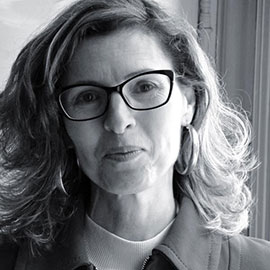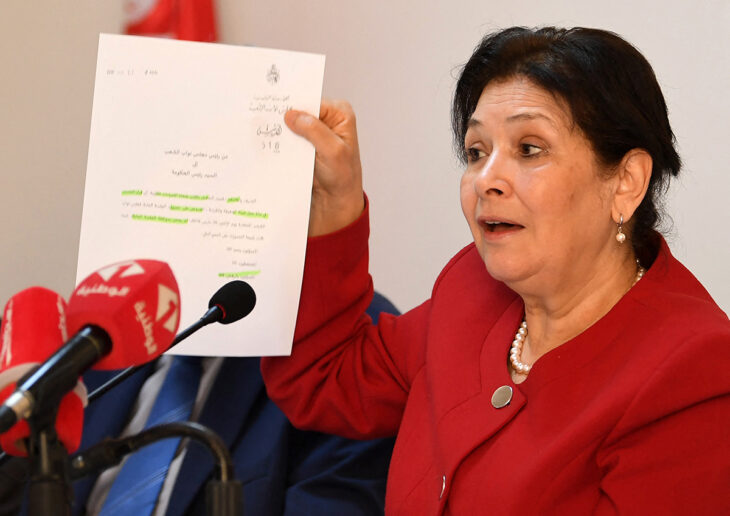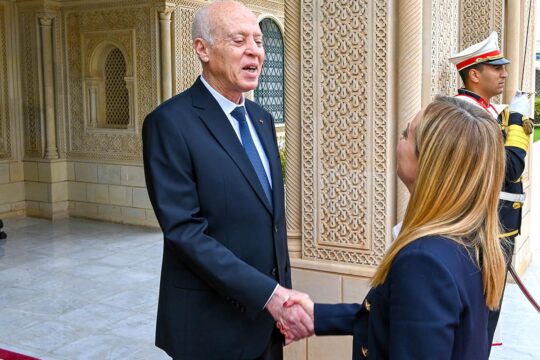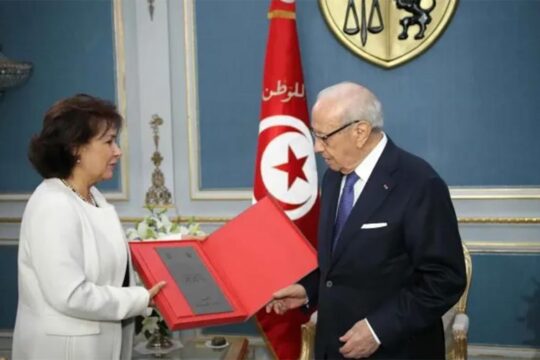On March 7, former president of the Truth and Dignity Commission (IVD) Sihem Bensedrine published on her Facebook page a statement informing of her March 2 summons by the judicial unit on economic and financial questions, where she was served with a ban on leaving the country. She added that the judge also notified her of her indictment for "obtaining unjustified advantages", "causing damage to the state" and "falsification". At the heart of the case is an allegation that she falsified the IVD’s final report.
In early March, Khaled Krichi, Oula Ben Nejma, Adel Maizi and Hayet Ouertani, former IVD commissioners between 2014 and 2019, as well as Mohamed Ben Salem, the vice president of the Commission, Rafik Jarray, the coordinator of the group of financial analysts of the IVD and Mohamed Ali Ben Gouta, who was responsible for investigating abuses in the banking sector, were also subjected to long hours of police interrogation in the premises of the Economic Brigade on the same issue.
The case of the "falsified" report has been in the Tunisian news in a recurring manner for four years, starting from March 26, 2019, when the truth commission’s final report was published on its official website. It was then that Ibtihel Abdellatif, former president of the Women's Commission at the IVD who was at odds with Bensedrine, claimed loudly in the media that the version on the Internet, and which according to the IVD is authentic, is different from the one sent to Tunisian president Béji Caied Essebsi (2014-2019) on December 31, 2018. She claimed that cuts and additional data were introduced there unilaterally by Sihem Bensedrine, "about 30 pages in all".
Old dispute on the Franco-Tunisian Bank
Abdellatif's accusations, which she incorporated into a complaint against Sihem Bensedrine, regained momentum when the report was finally published in the Official Gazette on June 24, 2020, at the initiative of Ayachi Hammami, then Minister of Human Rights. Bensedrine's detractors took over from Abdellatif and accused her of having added a page on the Franco-Tunisian Bank (BFT) in the online version of the report that did not exist in the version submitted to the President: the famous page 57 devoted to corruption.
The publication of the report in the Official Gazette marked the return to the spotlight of this thorny issue of the BFT, an emblematic case of banking corruption which has lasted 40 years and in which Tunisia was ordered to pay a heavy fine under an international arbitration ruling.
The case dates back to 1981, when the state sought to privatize this bank, confiscated in the 1960s from its French owner. Arab Business Consortium International (ABCI), half owned by franco-Tunisian businessman and lawyer Abdelmajid Bouden, acquired 50% of the bank’s shares which should have given it control of the BFT. But this operation was blocked by the State, and the funds meant to acquire a majority of the bank’s shares, instead of going to the BFT, were placed on the money market and the interest paid to the Tunisian Society of Banks (STB).
Despite this, Bouden became chairman of the BFT board of directors and took legal action against the STB, demanding the return of his funds. But in 1985 the authorities changed the legislative framework to stop Bouden exercising his rights as a director. In 1987, after the accession to power of former president Zine el-Abidine Ben Ali, the BFT was placed under judicial administration and Bouden was sentenced to 20 years in jail by a judiciary under the government’s thumb. In the meantime, the bank's managers set up a system of granting loans without guarantee intended for those close to Ben Ali’s regime and businessmen in his inner circle. Bouden left the country and filed a complaint against Tunisia before the London-based International Centre for Settlement of Investment Disputes (ICSID). In 2017, the ICSID ordered the Tunisian state to pay one billion dollars to ABCI -- a colossal sum for a country on the verge of bankruptcy.
Sihem Bensedrine's detractors
The final report of the IVD consists of seven volumes and 3,000 pages. It has been completely ignored by the government and no commission or working group has been created to implement its various recommendations. Only the contentious page 57 -- which recounts the successive episodes (1981 to 2010) in Bouden’s dispossession of his BFT investment assets and granting of loans without collateral to Ben Ali relatives – seems to attract attention. Indeed, on December 15, 2020, Badreddine Gammoudi, then chairman of the special parliamentary committee on administrative reform, good governance and fighting corruption, sent a letter to the government noting the contradictions between the two versions of the report and urging the officer in charge of state litigation to file a complaint against Bensedrine. And Mustapha Baazaoui, a former member of the truth commission who was dismissed for absenteeism in 2016, has more recently called on television for the report to be "unpublished" to "save the Tunisian state”.
One of Sihem Bensedrine’s fiercest opponents is Mabrouk Korchid, a lawyer, former MP and former Minister of State Property and Land Affairs between 2017 and November 2018 reputedly close to the former regime of Ben Ali (deposed in January 2011). He has on several occasions launched vehement diatribes against her in the media. He blames her, among other things, for having classified Abdelmajid Bouden among the victims of the dictatorship.
"This quality of victim gives him legitimacy and a dream argument that he will use against the Tunisian state before the ICSID,” said Korchid in an interview with Justice Info. “In addition, the changes to the final report introducing the case of the BFT are not legal, it’s a swindle. Sihem Bensedrine considers the IVD her property. Thanks to a strange rule of procedure, she has assumed many prerogatives, going so far as to lead a session of the commission Council that lacked a quorum."
Former IVD commissioner Baazaoui says it is the IVD itself that defined the sum of 1 billion dollars to give Bouden for the damage suffered. "Following the Tunisian truth commission, the same amount was awarded by the ICSID," he said.
"A campaign that aims to stop transitional justice”
The IVD did look at the Bouden case in its Investigations Commission. It is included in the commission’s financial corruption investigation files transmitted to the specialized criminal chamber of Tunis in December 2018. As with all cases of corruption, Bouden received a decision on symbolic compensation. "Bouden is entitled to an apology and a moral rehabilitation. Contrary to everything that has been said, no material reparation has been attributed to Bouden,” retorts former IVD officer Razan Hadj Slimane. “ The campaign that targets us wants to denigrate our work and stop the transitional justice process, which disturbs many people, including the lobbies of the former regime that are increasingly strong." In her March 7 press release, Bensedrine responds to the various charges against her: "The version of the report submitted on December 31 to the Presidency could neither materially nor technically be the final version of a report of 3,000 pages, since the IVD Council had voted to adopt the final report on December 30, 2018 and given its members until the end of January 2019 to make the corrections previously validated by the Council during the vote on each chapter of the report. This decision is recorded in its minutes of December 28, 2018, and the IVD president was charged with incorporating these validated corrections into the final report to be issued."
Sihem Bensedrine calls this a classic case of "disinformation". "The description of the risks borne by the Tunisian state in this arbitration case at the ICSID are assimilated with the 3 billion dinars compensation decided by the IVD, and presented as having "influenced" the ICSID decision in ABCI’s favour. But the final verdict of the ICSID condemning the Tunisian state for violation of investor rights and denial of justice was issued in July 2017, while the report of the IVD was published in March 2019. Unless it could influence the ICSID retroactively!”
A context of general repression
Are the IVD and its former president being used as scapegoats in the catastrophic management of the BFT case? This case has already cost the taxpayer a lot of money: the fees of foreign lawyers defending the interests of Tunisia before the ICSID amount to more than 250 million dinars ($80 million) paid, according to international economic expert Ezzedine Saidane, "mostly in foreign currency by transfers authorized by the Central Bank of Tunisia”.
On January 16, the BFT case was examined again by the specialized chamber of the Tunis Court of First Instance. Financial tycoons, still in office, were summoned to answer for crimes of breaching trust in the management of public funds, collusion with political authorities and risking the solvency of the State. The day after the hearing, the anti-IVD campaign was back in full swing. After being heard initially as a witness, Sihem Bensedrine is now appearing as an accused before an investigating judge of the economic and financial unit. Is her indictment an attempt to silence a critic of the current Tunisian government’s authoritarian drift and "the return of repressive methods during the last wave of arrests, which targeted several opponents of President Kaies Saied as well as a radio director", as she said on Jawhara FM on February 14?
Two years ago, on February 8, 2021, four UN special rapporteurs sent a letter to the head of government alerting him to the risks facing the transitional justice process in the country where the "Arab Spring" was born. "The allegations of financial mismanagement of the commission's operations, which were the subject of an investigation report by the Court of Auditors, should in no way serve as a pretext to invalidate its substantive work, cancel or stop judicial proceedings or to dismantle the accountability mechanisms,” they wrote. “Furthermore, guarantees must be sought to ensure that criminal investigations are not used as a reprisal for the facts contained in the work or reports of the IVD (...). We would like to recall that international norms require states to guarantee the work and legacy of truth commissions and to protect their members."
This warning resonates strongly with Bensedrine's statement issued on March 7. "Those who have exposed the corrupt are accused of corruption," she said in her headline.






